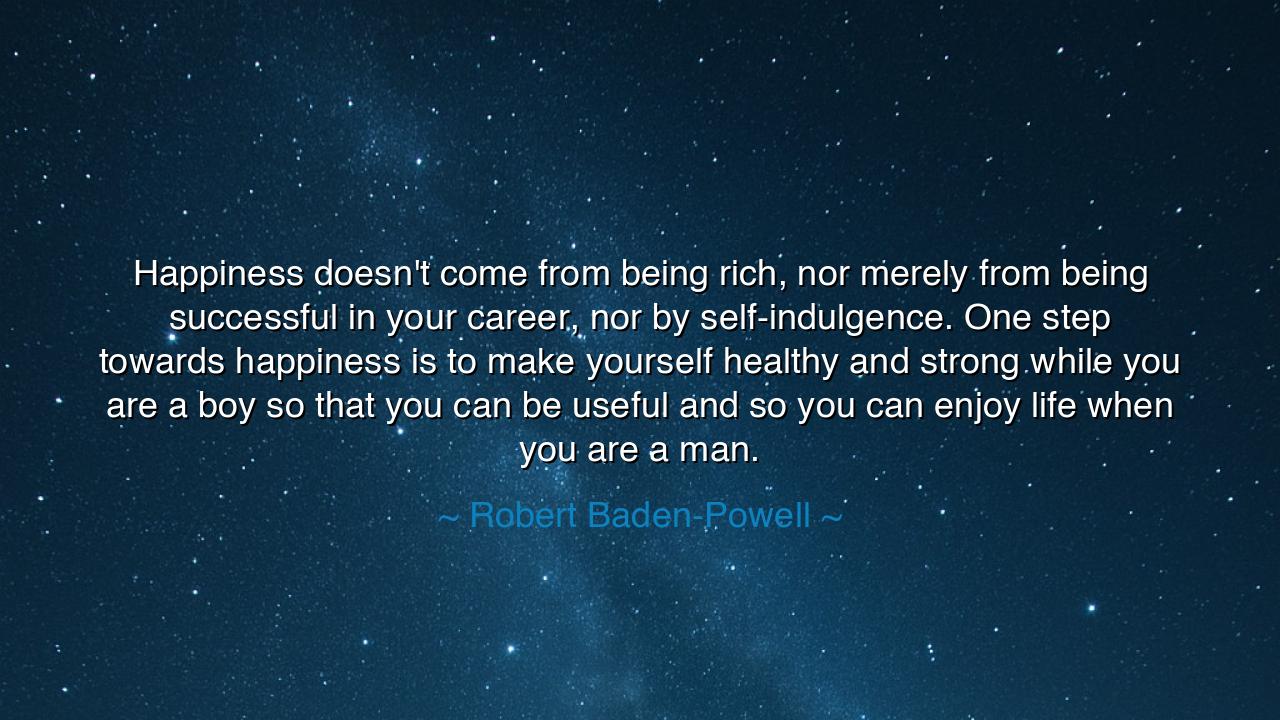
Happiness doesn't come from being rich, nor merely from being
Happiness doesn't come from being rich, nor merely from being successful in your career, nor by self-indulgence. One step towards happiness is to make yourself healthy and strong while you are a boy so that you can be useful and so you can enjoy life when you are a man.






“Happiness doesn’t come from being rich, nor merely from being successful in your career, nor by self-indulgence. One step towards happiness is to make yourself healthy and strong while you are a boy so that you can be useful and so you can enjoy life when you are a man.” — Robert Baden-Powell
In these noble words, Robert Baden-Powell, founder of the Scouting Movement, speaks with the wisdom of one who understood the soul of youth and the foundations of a meaningful life. His message is both simple and eternal: true happiness is not born of wealth, prestige, or the fleeting pleasures of indulgence. Rather, it springs from usefulness, from the strength of body and character that allows a person to serve others and live fully. Baden-Powell, who dedicated his life to shaping the minds and spirits of young people, reminds us that happiness is not an inheritance — it is a discipline, cultivated through health, purpose, and service.
To understand the origin of these words, we must look to the man who spoke them. Robert Baden-Powell was not merely a thinker; he was a soldier, a teacher, and a visionary who sought to prepare boys for life, not just for survival. After witnessing the decay of spirit brought by luxury and idleness, and the resilience born of endurance and labor, he came to believe that happiness is a byproduct of a well-lived life — a life grounded in strength, usefulness, and compassion. His teachings in Scouting for Boys were not merely about camping or knots; they were about the building of character. To him, every exercise of the body was also an exercise of the soul, preparing the youth for service, joy, and self-mastery.
Baden-Powell’s warning against riches and indulgence echoes the wisdom of the ancients. The philosophers of Greece and Rome said the same: Socrates taught that wealth does not bring goodness, but goodness brings wealth of the spirit. Marcus Aurelius, emperor and philosopher, wrote that the content man is not he who possesses much, but he who needs little. The pursuit of pleasure alone, they said, is a trap — it feeds the body but starves the heart. Baden-Powell, in his own age, carried that torch of truth forward, reminding the young that happiness cannot be purchased, but must be earned through effort, discipline, and generosity.
To make oneself healthy and strong is not merely to build muscle or endurance — it is to cultivate harmony between the mind, body, and spirit. The boy who runs, climbs, and works not only strengthens his limbs but also learns patience, perseverance, and humility. He learns that effort bears fruit, that struggle brings satisfaction. When he grows into a man, this strength becomes his foundation — enabling him to labor for others, to protect, to serve, and to delight in life without being enslaved by it. Thus, physical vitality becomes the servant of moral and spiritual vitality. A strong body, Baden-Powell teaches, houses a strong will.
Consider the example of Ernest Shackleton, the great explorer of the Antarctic. When his ship, the Endurance, was trapped and destroyed by ice, Shackleton led his men through unimaginable trials — freezing winds, hunger, exhaustion — and yet not a single life was lost. What saved them was not riches, nor status, but strength, discipline, and unity. Shackleton embodied the truth of Baden-Powell’s words: happiness and fulfillment are not found in comfort, but in usefulness — in the courage to endure hardship and to help others survive it. The joy of life, he proved, belongs to those who are ready to serve.
Baden-Powell’s teaching is not only for boys, but for all who would live nobly. He tells us that happiness is not pleasure, but purpose. To seek comfort alone is to grow weak; to seek meaning is to grow great. The path to joy begins in caring for the vessel — the body — that carries the spirit, and in shaping it into an instrument of good. A life devoted only to personal gain ends in emptiness, but a life devoted to usefulness and service becomes radiant. The one who gives strength to others multiplies his own.
So let this wisdom be passed down: True happiness is not given — it is built. Begin young, or begin now, by strengthening yourself in body, mind, and heart. Reject the illusion that wealth or indulgence can satisfy the soul. Choose instead the discipline of health, the pursuit of learning, and the joy of helping others. For when your strength becomes a gift to the world, you will know the happiness that neither time nor fortune can take away. As Baden-Powell taught, to live usefully is to live joyfully — and in serving others, you find the highest freedom of all.






AAdministratorAdministrator
Welcome, honored guests. Please leave a comment, we will respond soon